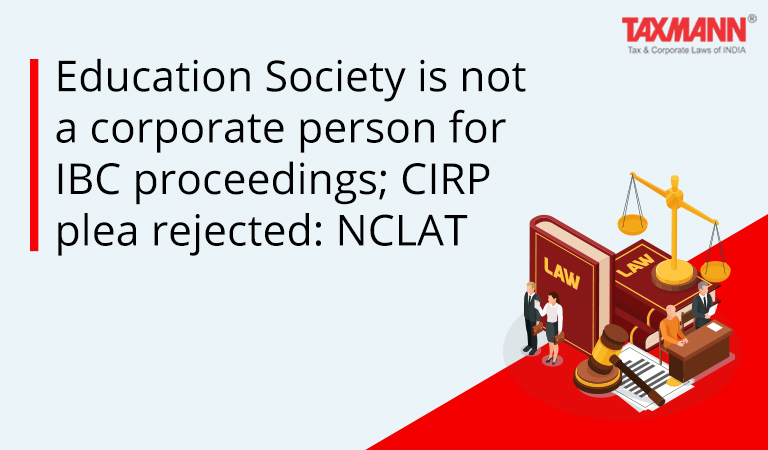Education Society is not a corporate person for IBC proceedings; CIRP plea rejected: NCLAT
- News|Blog|Insolvency and Bankruptcy Code|
- 2 Min Read
- By Taxmann
- |
- Last Updated on 12 November, 2021

Case Details: Asset Reconstruction Company (India) Ltd. v. Mohammadiya Educational Society - [2021] 132 taxmann.com 37 (NCLAT- New Delhi)
Judiciary and Counsel Details
-
- A.I.S. Cheema, Officiating Chairperson and Dr. Alok Srivastava, Technical Member
- Abhijeet Sinha and Karan Malhotra, Advs. for the Appellant.
- Ramji Srinivasan, Sr. Adv., Pawanshree Agarwal and Divyanshu Agrawal, Advs. for the Respondent.
Facts of the Case
In the instant case, the appellant-financial creditor filed an application under section 7 against the respondent corporate debtor claiming that the respondent defaulted in payment of an amount. The Respondent was a society governed by the AP Societies Registration Act, 2001.
The appellant claimed that as per section 18 of the A.P. Act, registration of society would render it to a corporate body and, thus, respondent was governed by the definition under section 3(7) and the application filed by it for initiating CIRP against the corporate debtor was maintainable. However, the respondent claimed before NCLT that it was a society registered under the Societies Registration Act, 1860 and that it did not fall under the purview of section 2 of the ‘I&B Code’.
The respondent claimed that it was not a body corporate and remained an unincorporated body. The respondent also claimed that section 18 of the A. P. Act confers the status of a body corporate for such societies registered thereunder and that the status of Body Corporate was not afforded to societies registered under the ‘1860 Act’.
The Adjudicating Authority by the impugned order held that the respondent was not a body corporate and dismissed the application filed by the appellant under section 7 against the respondent.
NCLAT Held
On appeal, the National Company Law Appellate Tribunal held that since respondent was not a company as defined in clause 2(20) of Companies Act, 2013 or ‘limited liability partnership’ as defined under Limited Liability Partnership Act, 2008 or any other person incorporated with limited liability under any law for time being in force, respondent society could not be said to be ‘corporate person’ to whom provisions of IBC could apply.
Case Review
-
- Asset Reconstruction Co. (India) Ltd. (ARCIL) v. Mohammadiya Educational Society [2021] 132 taxmann.com 36 (NCLT – Hyd.) (para 33) affirmed.
List of Cases Referred to
-
- Satyadeva Sannakaru Rythu Sangham v. State of Andhra Pradesh [WP No. 488 of 2006, dated 12-8-2011] (para 4)
- Somasundaram Memorial Social Educational Rural Development Society v. APSRTC 2011 SCC Online AP 821 (para 23)
- V. Kameswara Rao v. District Legal Services Authority-cum-VII Addl. District and Session Judge Court (Lok Adalat) 2014 SCC Online Hyd. 1467 (para 24)
- All India SC and ST Railway Employees Association v. E. Venkateshwarlu 2003 SCC Online AP 97 (para 25)
- Illachi Devi v. Jain Society, Protection of Orphans India [2003] 8 SCC 413 (para 27).
Disclaimer: The content/information published on the website is only for general information of the user and shall not be construed as legal advice. While the Taxmann has exercised reasonable efforts to ensure the veracity of information/content published, Taxmann shall be under no liability in any manner whatsoever for incorrect information, if any.

Taxmann Publications has a dedicated in-house Research & Editorial Team. This team consists of a team of Chartered Accountants, Company Secretaries, and Lawyers. This team works under the guidance and supervision of editor-in-chief Mr Rakesh Bhargava.
The Research and Editorial Team is responsible for developing reliable and accurate content for the readers. The team follows the six-sigma approach to achieve the benchmark of zero error in its publications and research platforms. The team ensures that the following publication guidelines are thoroughly followed while developing the content:
- The statutory material is obtained only from the authorized and reliable sources
- All the latest developments in the judicial and legislative fields are covered
- Prepare the analytical write-ups on current, controversial, and important issues to help the readers to understand the concept and its implications
- Every content published by Taxmann is complete, accurate and lucid
- All evidence-based statements are supported with proper reference to Section, Circular No., Notification No. or citations
- The golden rules of grammar, style and consistency are thoroughly followed
- Font and size that’s easy to read and remain consistent across all imprint and digital publications are applied



 CA | CS | CMA
CA | CS | CMA
